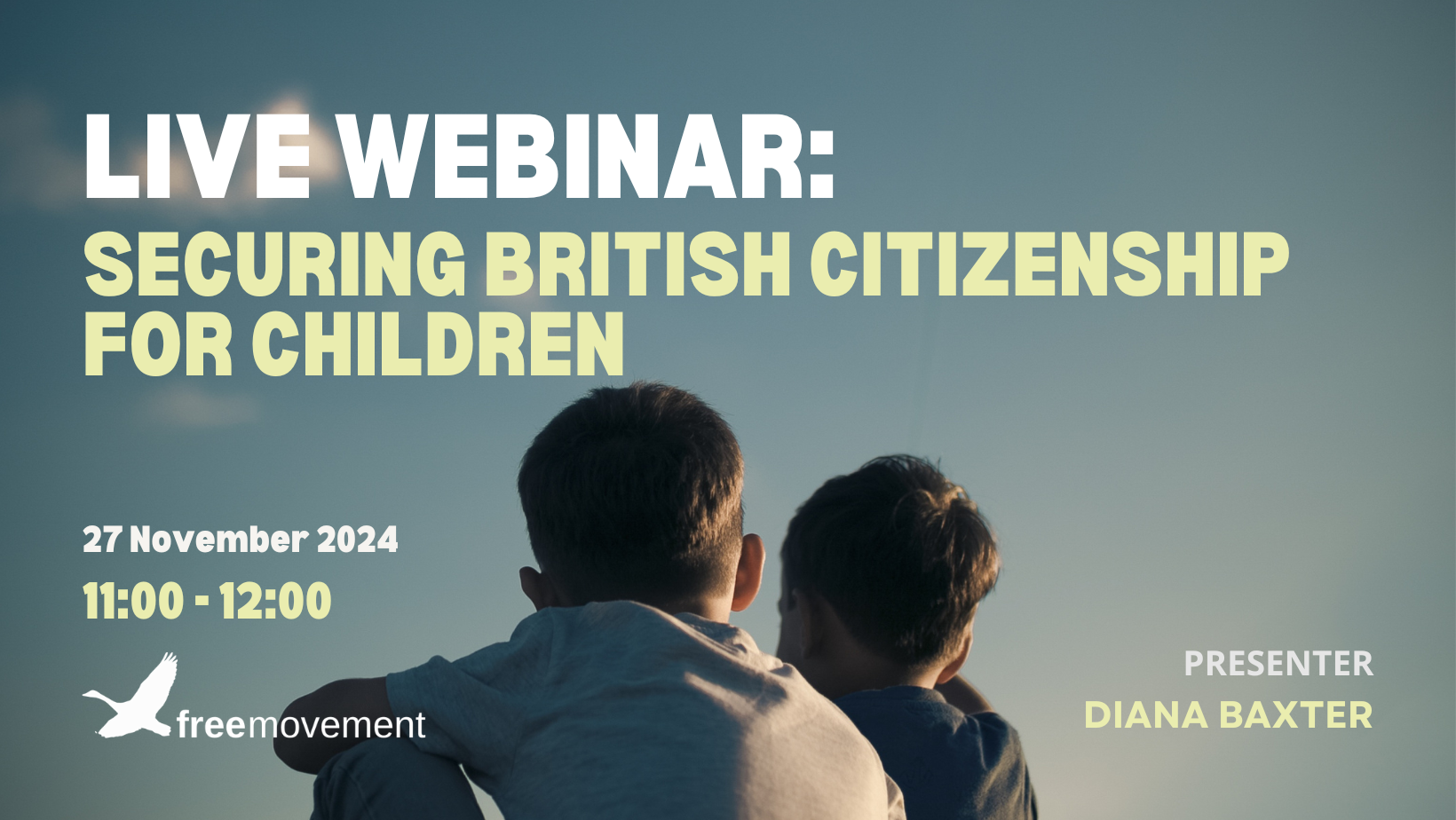By Alex Papasotiriou – Immigration Barrister
Within the ever-evolving panorama of worldwide regulation, a notable current incidence is the supply of Advocate Common Emiliou’s Opinion in Case C‑563/22 SN and LN on 11 January 2024. This case, arising from a preliminary ruling request by Bulgaria’s Administrative Courtroom, delves into the interpretation of Article 12(1)(a) of the Qualification Directive (Directive 2011/95/EU), shedding gentle on the precise authorized regime relevant to stateless individuals of Palestinian origin.
On this publish, we embark on a complete exploration of the Advocate Common’s Opinion and its potential ramifications within the UK, notably contemplating the aftermath of Brexit. Whereas acknowledging that EU regulation and the Courtroom of Justice of the European Union’s rulings now not bear binding power within the UK, we delve into the intricacies of how this Opinion should still maintain relevance inside the UK jurisdiction.
The Advocate Common’s Opinion and its Relevance within the UK
On 11 January 2024, Advocate Common Emiliou delivered his Opinion in Case C‑563/22 SN and LN, following a request for a preliminary ruling from Bulgaria’s Administrative Courtroom concerning, inter alia, the interpretation of Article 12(1)(a) of the Qualification Directive (Directive 2011/95/EU). This particulars the precise authorized regime relevant to stateless individuals of Palestinian origin who’ve availed themselves of the safety or help of the United Nations Aid and Works Company (for Palestine Refugees within the Close to East) (UNRWA).
Since Brexit and the repeal of EU regulation, the Courtroom of Justice of the European Union’s preliminary rulings don’t have any binding power within the UK, aside from for issues regarding the Withdrawal Settlement. Equally, EU regulation is now not immediately relevant and the provisions of the Qualification Directive have seemingly been repealed by the Immigration and Social Safety Co-ordination (EU Withdrawal) Act 2020, because the Supreme Courtroom concluded in relation to the Procedures Directive throughout the Rwanda litigation.
Nonetheless, this Opinion (and supplied the Courtroom of Justice takes the identical view within the ensuing preliminary ruling) is of relevance to the UK jurisdiction. Article 12(1)(a) of the Qualification Directive each refers to and mirrors the contents of Article 1D of the 1951 Refugee Conference, to which the UK is a signatory. This states:
This Conference shall not apply to individuals who’re at current receiving from organs or companies of the United Nations aside from the United Nations Excessive Commissioner for Refugees safety or help.
When such safety or help has ceased for any cause, with out the place of such individuals being definitively settled in accordance with the related resolutions adopted by the Common Meeting of the United Nations, these individuals shall ipso facto be entitled to the advantages of this Conference.
In Said (Article 1D : meaning) [2012] UKUT 413, the Higher Tribunal held that the Courtroom of Justice’s pronouncement on the that means of Article 12(1)(a) of the Qualification Directive is a pronouncement on the autonomous that means of Article 1D.
Article 1D of the Refugee Conference
Article 1D of the Refugee Conference comprises each an exclusion and an inclusion clause. If an individual is receiving safety or help from companies of the UN aside from the UNHCR, then the Refugee Conference is not going to apply to them. Nevertheless, if that safety or help may be thought-about to have ceased, the exclusion clause now not applies and such individuals shall ipso facto (by cause of this alone) turn into entitled to the advantages of the Refugee Conference: refugee standing. In observe and though not explicitly said as such, these clauses apply solely to stateless individuals of Palestinian origin and, extra particularly, solely to those that have availed themselves of the safety or help of UNRWA.
In his Opinion, AG Emiliou confirms the context wherein Article 1D arose: It was drafted shortly after the Israeli–Arab battle of 1948, with a view to, inter alia, stopping a mass exodus from the geographical space which was once Palestine and, on the identical time, to making sure that stateless individuals of Palestinian origin – who’ve been recognised as refugees by the worldwide neighborhood – continued to obtain efficient safety or help till their place had been definitively settled in accordance with the related resolutions of the Common Meeting of the United Nations. It has been held that stateless individuals of Palestinian origin should have the ability to obtain efficient safety or help from UNRWA, and never that they’re merely assured the existence of a physique or company, the duty of which it’s to offer such help or safety.
Earlier CJEU Rulings
The Courtroom has beforehand dominated (in C-364/11 – Abed El Karem El Kott and Others) that the cessation of UNRWA’s safety or help occurs not provided that that company ceases to exist, but additionally if the particular person involved has been compelled to depart UNRWA’s space of operation for causes unconnected along with his or her will. Such is the case if the private security of the person involved is at critical danger (first requirement) and whether it is not possible for that company to ensure that that particular person’s dwelling situations in its space of operation are commensurate with the mission entrusted to it, which is to make sure ‘dignified’ dwelling situations (second requirement).
In a earlier ruling in Case C-349/20, NB and AB v Secretary of State for the Home Department, the Courtroom confirmed that, in assessing whether or not UNRWA help has ceased for an individual, the nationwide authorities should take into account not solely the explanations which led the particular person to depart the UNRWA’s space of operation, but additionally whether or not an efficient risk of returning exists. Account should be taken of factual components, as they exist at, not solely on the time of that particular person’s departure from the UNRWA’s space of operation, but additionally when his or her utility is into account.
As such, Palestinians which were registered with UNRWA and acquired help or safety fall outdoors the scope of the Refugee Conference, except that safety or help has ceased. If, following an asylum utility, it’s discovered that safety or help has ceased and no different exclusions from the Refugee Conference are relevant, refugee standing should be accepted with out additional consideration of whether or not the applicant is a refugee inside the that means of Article 1A(2) of the Conference. The request for the preliminary ruling concerned questions regarding the evaluation of whether or not the UNRWA’s safety or help has ceased.
Authorized Standards in Contemplating whether or not the UNRWA’s Help has Ceased
Taking this as a place to begin and in view of the questions of the referring court docket, AG Emiliou sought to make clear the authorized standards that should be utilized and the circumstances which are related to the evaluation of whether or not the UNRWA’s help or safety has ceased. In that context, AG Emiliou confirmed that the the overall dwelling situations prevailing within the space of operation of UNRWA (or part of it) may be ample to determine that an individual might be uncovered to remedy incompatible with Article 3 ECHR (and thus, the dwelling situations are “undignified”), if she or he is to return there, and, subsequently, that the UNRWA’s safety or help in respect of her or him has ceased. AG Emiliou listed three varieties of conditions the place that could be the case:
1. Conditions the place the overall dwelling situations are undignified for everybody.
AG Emiliou careworn that solely a very critical scenario can produce such a blanket prohibition and what’s required is a critical danger that individuals returned to that space would, due to these main operational issues or systemic flaws, discover themselves in a scenario of maximum materials poverty that doesn’t permit them to satisfy their most elementary wants, akin to, inter alia, meals, private hygiene and a spot to reside, and that undermines their bodily or psychological well being or places them in a state of degradation incompatible with human dignity. In such instances, the place that threshold is met for nearly everybody, candidates can’t be required to display that these common situations are undignified for them in an individualised method, or that they’re particularly affected.
2. Conditions wherein the applicant should present that she or he belongs to a very weak group.
The place the overall dwelling situations usually are not deemed undignified for nearly everybody, the circumstances should still generate ‘undignified living conditions’ for sure notably weak teams of individuals (or sure notably weak individuals, as I’ll clarify within the subsequent part) by not permitting them to satisfy their most elementary wants. Youngsters, as an illustration, have been thought-about a very weak group with particular wants and it’s usually accepted that dwelling situations which can’t be considered ‘undignified’ for adults might nonetheless be thought-about as such for kids as a bunch. In such conditions, individuals belonging to a very weak group should not have to indicate that the overall dwelling situations are undignified for them in an individualised method, as long as it may be established, first, that these common dwelling situations are extreme sufficient to be deemed ‘undignified’ for anybody belonging to that group and, second, that the applicant’s related private circumstances (for instance, the age, gender or explicit situation or incapacity) qualify her or him as a part of that group.
3. Conditions the place the particular person involved should present that she or he has a specific vulnerability or is particularly affected by the overall dwelling situations due to his or her private circumstances.
The place the overall dwelling situations can’t be considered undignified for nearly everybody or for a number of notably weak teams, dwelling situations should still be undignified for sure individuals who should be considered notably weak on account of their private circumstances, or who’re particularly affected by the identical common situations by cause of things explicit to their private circumstances. In such instances reliance needs to be positioned on the affect of the overall dwelling situations to the particular person in an individualised method.
In abstract, Palestinians who have been registered with UNRWA and who’ve fled a part of its space of safety could also be eligible for refugee standing if they’ll display that the scenario in that a part of UNRWA’s space of operation (as an illustration, the Gaza strip) has led to common dwelling situations which are: i) undignified (in different phrases, meet the Article 3 ECHR threshold) for nearly everybody; ii) undignified for anybody belonging to a very weak group, to which the applicant belongs (as an illustration, kids); or iii) undignified for the applicant themselves, on account of their private circumstances or the diploma to which they might be particularly affected by the overall dwelling situations.
AG Emiliou careworn that an asylum utility ought first to be made and these issues should be thought-about and assessed on a person foundation. Even whether it is concluded that the applicant has availed themselves of safety or help from UNRWA and that this safety has ceased, the particular person should still be excluded from refugee standing by different provisions of the Refugee Conference (akin to Article 1F). It was additionally confirmed that whether or not an individual could also be entitled to humanitarian safety is a separate consideration that’s not related to the evaluation beneath Article 1D.
The Significance of the Advocate Common’s Opinion
This Opinion isn’t with out its limitations. AG Emiliou was clear that the evaluation of the factual circumstances is a matter for the nationwide authorities and home courts and the Courtroom of Justice can solely interpret EU regulation. Additional, it was clear that whether or not an individual is entitled to refugee standing on account of Article 1D needs to be thought-about on a case by case foundation within the context of an asylum utility.
Nevertheless, the Opinion can also be vital: it paves the best way for an evaluation, made inside the context of particular person asylum claims (though with wider ambit lest the circumstances change), on whether or not the scenario within the Gaza Strip has at present reached a stage of severity that meets the brink of Article 3 ECHR for nearly everybody or for notably weak teams. In such conditions, an asylum applicant who was registered with UNRWA within the Gaza Strip and who has fled and claimed asylum in a rustic that may be a signatory to the Refugee Conference can depend on the overall dwelling situations there to display that the UNRWA’s safety or help has ceased, which can entitle them to refugee standing. It might nonetheless be useful in any occasion to particularise the affect on the particular person, though not essential, supplied that the overall dwelling situations are discovered to have reached that stage of severity.
As set out above, the Courtroom of Justice could take a distinct view and their ruling wouldn’t be binding on the UK, however it’s troublesome to envisage a sound cause for the Residence Workplace and home courts taking a distinct strategy, in view of the mirroring content material of Article 1D of the Refugee Conference and Article 12(1)(a) of the Qualification Directive.
Contact our Immigration Barristers
For professional recommendation and help with asylum purposes and appeals, contact our immigration barristers in London on 0203 617 9173 or full our enquiry type beneath.








1 Comment